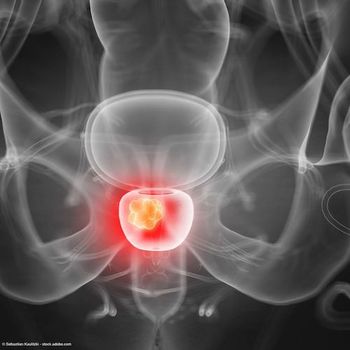
Fluciclovine F 18 PET/CT imaging frequently alters management of recurrent prostate cancer
The PET radiopharmaceutical led to a shift in the management of nearly two-thirds of men with biochemical recurrence of prostate cancer.
Fluciclovine F 18 (Axumin) PET/CT imaging led to a shift in treatment course in nearly two-thirds of patients with recurrent prostate cancer, according to a secondary, posthoc analysis of data from the LOCATE and FALCON trials.1
According to Blue Earth Diagnostics, the developer of fluciclovine F 18, this secondary analysis evaluated the effect of the PET radiopharmaceutical on the site of disease recurrence and decisions regarding androgen-deprivation therapy (ADT) in men with biochemically recurrent prostate cancer.
The findings showed that fluciclovine F 18 detected lesions in 58% (n = 85) of patients. The rate of detection was 30% (44/146) in the prostate/bed and 25% (37/146) in the pelvic lymph nodes. The detection rates in the extra-pelvic lymph nodes, soft tissue, and bone were 13% (19/146), 2.1% (3/146), and 13% (19/146), respectively.
Overall, there were 146 patients who were designated to receive ADT prior to fluciclovine F 18 scanning. The management plan was altered in 64% (n = 93) of these patients following imaging with the PET radiopharmaceutical. Fifty-five (59%) of these 93 patients were able to delay ADT or avoid it completely. Further, only 25% (n = 15) of 60 patients initially assigned to ADT monotherapy remained on schedule to receive the treatment following fluciclovine F 18 scanning.
“Prostate cancer will recur in up to 30% of patients after initial treatment. The ability to determine the extent and location of recurrent prostate cancer, in conjunction with other available clinical information, can inform the management plan for men with recurrent disease. Informed decision-making can facilitate personalized patient management. ADT is commonly used to treat recurrent prostate cancer, but may produce undesirable side effects for many patients, and may also lose effectiveness over time,” Gerald L. Andriole, MD, the Robert K. Royce Distinguished Professor and Chief of Urologic Surgery at Washington University School of Medicine, stated in a press release.
“This analysis of data from the LOCATE and FALCON trials indicated that ADT was avoided in approximately 40% (55/146) of the men originally intended for ADT, based on the information provided by 18F-fluciclovine PET/CT imaging. Management plans were commonly amended to target salvage therapy to lesions identified with 18F-fluciclovine PET/CT, and consequently likely spared these patients the potential systemic morbidity often associated with ADT,” added Andriole.
Fluciclovine F 18 is approved by the FDA for PET imaging in patients with suspected recurrence of prostate cancer based on a rise in their PSA levels after prior therapy.
LOCATE trial
The multicenter, prospective, open-label LOCATE trial (NCT02680041) assessed fluciclovine F 18 in men with an elevation in their PSA level following initial treatment for prostate cancer. Results showed that the inclusion of fluciclovine F 18 imaging with a patient’s diagnostic work-up led to an alternation in the management plan for 59% (n = 126) of 213 patients. Of these patients, 78% had a change in their treatment modality.
FALCON trial
The open-label, prospective, multicenter FALCON trial (NCT02578940) compared pre- and post-scan management plans for patients with biochemically recurrent prostate cancer who received fluciclovine F 18 imaging. Results of fluciclovine F 18 changed the clinical management plan for nearly two-thirds (64%; 66/104) of patients. Further, 65% (43/66) of these patients had a change in treatment modality following their fluciclovine F 18 scan.
Reference
1. Blue Earth Diagnostics Announces Results of an Analysis of the Impact of Axumin® (Fluciclovine F 18) PET/CT Imaging on Androgen Deprivation Therapy (ADT) Planning in Recurrent Prostate Cancer. Published online September 27, 2021. Accessed September 27, 2021. https://bwnews.pr/3CPVN8T.
Newsletter
Stay current with the latest urology news and practice-changing insights — sign up now for the essential updates every urologist needs.






